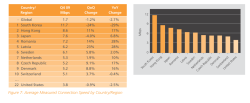Report: Russia as an origin of attacks

![]() Most attackers target port 445, a port Windows computers use for file sharing.
Most attackers target port 445, a port Windows computers use for file sharing.
Source: Akamai
Content Delivery Network provider Akamai has released its State of the Internet report for the fourth quarter of 2009, investigating attacks on internet computers as well as internet usage worldwide. The report states that the network traffic caused by such attacks from Russia remained stable at 13%, which is at the top of the list. About 12% of the traffic was said to be caused by attacks originating in the US – compared to the previous quarter, this represents an increase of 5.1 points. Attacks from China only rank third, and their proportion increased slightly from 6.5 to 7.5%.
As in previous reports, the most common attack target (74%) was port 445 (Microsoft DS), which Akamai thinks could be due to the continued activities of the Conficker worm. However, the authors of the report say that they couldn't establish this conclusively because Akamai doesn't investigate packet payloads. Attacks on other ports such as SSH (22), NetBIOS (139), Microsoft RPC (135) and Telnet (23) each only constitute a single digit proportion of the total figure.
Akamai's report also investigates the number of unique IPv4 addresses, which increased by 4.7% in comparison with the third quarter of 2009, and by 16% in comparison with the fourth quarter in 2008. In absolute terms, the US with 124.953.865 addresses is far ahead of China (52.113.869) and Japan (32.259.547). Incidentally, the highest number of IP addresses per capita can be found in Norway, Sweden and Finland. Germany ranks ninth in this regard.

![]() Despite losing some points, South Korea with its average speed of 11.7 Mbits/s remains at the top of the high-speed internet connections list.
Despite losing some points, South Korea with its average speed of 11.7 Mbits/s remains at the top of the high-speed internet connections list.
Source: Akamai
The report also registers the respective connection speeds. Akamai breaks down internet connections into low-speed and high-speed connections (2Mbits/s and above). According to the report, the average global internet connection speed decreased by almost 3% to 1.7 Mbits/s compared to the previous year. Also interesting is that the average connection speed in South Korea, the leader in the field of high-speed internet connections, decreased by 24% in comparison with the third quarter of 2009. The authors of the report comment that, looking at the original data, this decline was probably caused by the introduction of the iPhone in South Korea in November 2009.
Compared to the third quarter of 2009, the global number of low-speed connections (256 Kbit/s and below) to Akamai's computer centres also increased by 41%. It is hardly surprising that most of these connections originate in areas such as Cuba or the French overseas territory of Mayotte. The list of broadband connections above 2 Mbits/s, on the other hand, is topped by European and Asian countries.
(crve)








![Kernel Log: Coming in 3.10 (Part 3) [--] Infrastructure](/imgs/43/1/0/4/2/6/7/2/comingin310_4_kicker-4977194bfb0de0d7.png)

![Kernel Log: Coming in 3.10 (Part 3) [--] Infrastructure](/imgs/43/1/0/4/2/3/2/3/comingin310_3_kicker-151cd7b9e9660f05.png)








